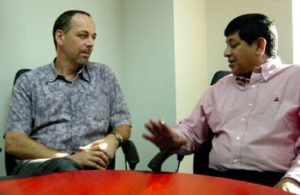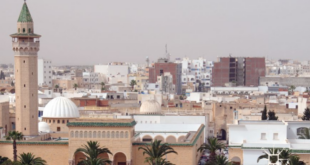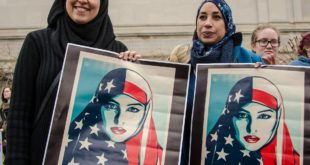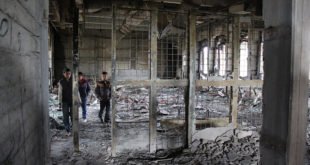
TBS: When did you start broadcasting?
Siddiqi: We went on air July 27th.
TBS: In the short time since that launch, I think you've come a long way. Could you evaluate for us now what you did to achieve this and what you plan to do?
Siddiqi: The idea was to establish the first international Arabic-speaking business news channel. The aim was to create a channel which contributes information itself in terms of dissemination of knowledge which leads to a better understanding of economies in each country in the region, and which gives better perspective to those who want to invest in the region. Knowledge and information help investment flow.
TBS: Is that investment flow one way or both ways?
Siddiqi: I'm talking inter-regional. Let me give you an example: in Egypt, when they devalued the currency, it was hardly reported in the Arab world, but if CNBC Arabiya had been there, it would have gone into why, how, and what was happening and people would have had a better understanding of what is going on in Egypt.
TBS: Given that the markets have changed over the last two years, has that impacted your audience?
Siddiqi: Absolutely and I'll tell you why. When it's good times people look to us and when it's bad times people want information. That's your answer. But conceptually as a channel we are different in comparison to CNBC Europe and US. The difference is that in the US and Europe you have developed stock markets. Our stock markets are not deep enough to devote that much time to, so we devote one hour or one-and-a half hours a day. The rest of it is devoted to technological developments, business news.
But then when you look at these new stations, you think of five years hence. You think you have five years to develop this station, so you look at the elements that you have to develop it. You have the Dubai International Investment Center (DIFC) that they've just announced. It has major investment banks, insurance companies, private banks, and so on. So, looking at it, you know that this could be a very serious financial market. So in terms of CNBC Arabiya, looking at the financial development here, look at the channel three years from now and it makes sense. And within the DIFC, everything is denominated in dollars.
TBS: How do you define the region, because traditionally this area has strong links to the subcontinent and Iran.
Siddiqi: Our coverage is of the Arab World, stretching right up to the Maghrib. Among our arrangements we are actively pursuing in the next three of five years, we are looking to establish local CNBC terrestrial channels, such as CNBC Egypt, CNBC Jordan. You have the capacity to produce programming at least 10-12 hours a day. If you are looking at CNBC Egypt terrestrial, the country does not have a capacity to have a 12-hour broadcast, so what you do is you bring in your regional program and you supplement it with local programs and there you have a channel.
TBS: Where will the first CNBC Arabiya terrestrial channel will be?
Siddiqi: We don't know. Look at the time frame: we launched in July and we've been here for 10 weeks. So far we have been taken up with the issue of distribution and re-distribution. Over time we will develop bureaus.
TBS: What are you doing for expatriate Arab communities?
Siddiqi: For US distribution, there is something on the table whereby NBC and CNBC put together an array of foreign networks and put them through the local network.
TBS: What is the relationship between CNBC and CNBC Arabiya like at the moment? Is it the same as the relationship CNBC has with CNBC Europe and Asia?
Siddiqi: Asia and Europe are 50 percent owned by Dow Jones. In some countries they [CNBC] put in equity. In the Middle East it's a 20-year franchise agreement. On the news-gathering side we can pick up whatever we want from Asia and Europe as they can from us.
Edmonds: We provide programs to Europe and Asia, like "The Middle East This Week." We had this program before the launch, so we carried it over. In addition, we are doing a daily program in English for Dubai TV.
TBS: Is there no coverage in English on CNBC Arabiya?
Siddiqi: No.
Edmonds: In London, we have our own people so basically there is a sharing of support. We've already discussed them doing stuff out of here. We are not sharing with Asia much, because there is not much interest from either side.
TBS: Since you've opened what has been your biggest story?
Siddiqi: We had the IMF conference, which gave us access to a whole range of senior people from the region and the international community.
Edmonds: I think we spoke to around 50 people over the two days of the conference, half of whom were finance ministers, governors of central banks, and so on.
Siddiqi: I think it was the angle of the news cuts that gave us a head-up over Al Arabiya and other news channels in the Middle East.
Edmonds: We went in as a business channel talking to people who are affected by business, and everyone else went to cover this as a news event. They missed the idea of covering issues in relation to Iraq and other Arab countries.
TBS: Where are you as of now?
Edmonds: We have a full bureau in Cairo and in Beirut, and we have a group of freelance stringers in Iraq. London and New York are bureaus. Saudi Arabia is next on the list. CNBC Arabiya hopes to have representation in Saudi Arabia. It would be 100 percent ownership.
TBS: I think business becomes interesting to people when it has relevance to daily life. For example, going down to the gold souk knowing gold is 10% cheaper.
Edmonds: I think part of the problem is that if you can't see what it looks like, you can't imagine yourself within this particular industry. I think traditionally it has been rather dull. We are looking for the applicable side of it. Here are the numbers; here is the analysis and the relevance. You decide.
TBS: Where are your reporters mainly from?
Edmonds: Pretty much from everywhere: Egypt, Sudan, Lebanon. Cyba Audi is ex-Merrill Lynch. She was working in private banking in London. A lot of them have either strong economic or television backgrounds.
It was tough setting up, because even the Adham Center doesn't produce business television in Arabic. In the initial phase we created a range of skills: we had television journalists, business journalists, and it was the only way to go. We spent three months on training courses for the business guys, television guys. Some had really strong economics background and others had very strong television backgrounds. They've learnt off each other. This has really contributed to the success of the station.
TBS: To what extent have international news agencies picked up on what is happening here?
Siddiqi: Reuters and AP have obviously picked it up.
Edmonds: Perhaps not as many as we'd like-Reuters, UTI, and AP. What Reuters and AP have in Arabic is all translated. There is no network for them to distribute it on because they don't have much space devoted to business. Working in Asia, you had much more. So when Reuters sees us here, they have to translate it into English then back to Arabic.
TBS: Besides the trade summit here, what other stories have you made your mark on?
Siddiqi: The business relationship between Kuwait and Iraq. There's a lot of money being made in Kuwait and it's having repercussions on the economy. There is talk of establishing a land port between Iraq and Kuwait to facilitate trade between the two.
TBS: What percentage of your coverage is local?
Edmonds: For example we are doing nine hours a day live and one-and-a-half of those focus deliberately on Europe and the States. On Friday, most markets in the Middle East are shut. So Friday we devote to Europe and US. All in all, 15-20 percent is international coverage.
TBS: You said you are on air for 24 hours.
Siddiqi: Yes.
TBS: We couldn't find your channel at the hotel.
Siddiqi: A hotel has a limited capacity to hold channels, and if they take off one then they can put you in. They need to be convinced that we are the right channel they need. We are having on-going discussions about this with stock exchanges, malls, airports, and satellite distributors.
Edmonds: I think with distribution, you have to remember that we've been around for 10 weeks, and this is a tiny, tiny time. From someone who has launched 3 channels, the fact that we've had black-on-air for 3 seconds is incredible.
Siddiqi: We have commissioned two different companies to do research for us. We expect them to come up with their report.
TBS: Do you conceive yourselves of having any meaningful competition?
Siddiqi: No.
Edmonds: It's a particularly difficult skill set and field to come into.
TBS: When do you project breaking even?
Siddiqi: Year three. We can say we are on target as far as advertising and budget are concerned.
TBS: CNBC Europe represents you?
Siddiqi: Yes. We represent [CNBC] US, Asia, and Europe here and they represent us there.
TBS: Talking about financing, who owns what?
Siddiqi: I own 10 percent and 90 percent is owned by one company in which you have 35 investors, who are represented on the board by one person. Management rests with me. That consortium is Middle Eastern. As to taking the station onto any regional listing; I think it'll be three years. Our total projected cost till December is 27.5 million dollars. It really does depend on how it all moves and you cannot predict how it is going to go. The current feedback that we have received is very positive.
TBS: It's anecdotal, not researched?
Siddiqi: We have commissioned our own bigger [research] stuff, but all the agencies are doing their own research and the feedback from them was great.
TBS: You went to the states recently for a conference. How significant was it?
Siddiqi: It was the US-Arab Economic Forum. It was organized by the Arab American Chamber of Commerce and the State Department; they were supported by the large Multinational companies, Ford, Chevron, Intel. They were also supported by the State department, with security, etc. The basic outcome of it was that the "US has a stake in this region." It needs to promote this region in terms of both economic and political stability. There needs to be a change in terms of understanding cultures, in terms of a greater understanding of the Arab World.
TBS: For background, could you describe your set up here in terms of the amount of space you have, the physical plant, and the cost?
Siddiqi: It is 7.9 million dollars. That's everything, the building fit-out and everything. We have the whole of the first floor and half of the second floor, for HR, finance, sales, and marketing.
TBS: How is your relationship with Dubai Media City?
Siddiqi: Our relation with Media City has been excellent. And I'd like to stress that we have the full support of the Dubai Government as well. Sheikh Mohammed said he wanted to come himself and open it himself. He spent an hour and a half here, where it would only take, say, 5 to 8 minutes to walk around the whole office.
Edmonds: I remember when he popped into the control room and the guy in the control room asked him if he wanted to sit and watch one of the programs and he sat down and watched the local stock market figures coming up.
Siddiqi: He was so fascinated by the fact that we are such a lean company—how could we own something so big?
TBS: Would you like to tell us a bit about the equipment?
Edmonds: Being a lean operation, we have automated our system using robotics for camera men, the lighting has a set memory system and we are using a low resolution browser, making it possible for people to do rough edits on it and then send it back. In low res we can use standard computers with video cards; as soon as a picture comes on a server, reporters, guys on air, everyone, has access to it simultaneously. When we get it working, we are going to get a transfer rate of 6 times real time. We are the first to use low resolution browser. We are using Sony DV—they're big cameras, look like beta cams. The biggest human resource has been the editorial.
TBS: You mentioned you have a lean operation. What is your staffing?
Edmonds: In programming we have 45, and 35 in operations. In the field, counting in bureaus as well, we have 25, and half-a-dozen stringers.
TBS: So you will increase your stringers over time?
Edmonds: Actually, it's the other way round: the stringer figure will go down and the full-time will go up. We start off with stringer, then when we get comfortable with them we put them on a retainer, and eventually bring them in full-time. With a place like Iraq, for example, stringers are important: you can drop stringers into secondary cities, like Basra.
TBS: Are you using experts, such as an oil expert?
Edmonds: We talk to the experts in the field because they are experts. We don't pay retainers.
TBS: Traditionally, the Maghrib has been neglected, so are you talking about a potential bureau in Tunis?
Edmonds: Everywhere we have a stringer we hope to have a bureau.
Siddiqi: We have Bahrain going, we have Beirut coming. It's about prioritizing—and I mean, we've only been around for 10 weeks.
 Arab Media & Society The Arab Media Hub
Arab Media & Society The Arab Media Hub




